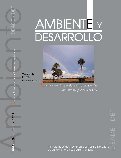Abstract
En la zona de Pedro Santana, en la parte suroeste de la Cordillera Central Dominicana,la adopción de barreras muertas para la conservación de suelos, hechas demateriales vegetales muertos como tallos y ramas, por los campesinos ha sido muyprecaria. Los resultados de varios eventos de diagnóstico rural participativo y dediálogos semiestructurados sugieren que esto está relacionado con la acumulaciónde plagas de habichuelas en los restos vegetales muertos, y con los pocos beneficiospercibidos de esta técnica, más que con la inversión en términos de trabajo y dinero.Como alternativas se sugieren: la promoción de cultivos de cobertura y abono verde,las técnicas alternativas de control de babosas, la reducción de la alta predominanciadel cultivo de habichuelas, la promoción de cultivos permanentes como frutales y eldesarrollo de una economía forestal.Ambiente y Desarrollo is registered under a Creative Commons Attribution 4.0 International Public License. Thus, this work may be reproduced, distributed, and publicly shared in digital format, as long as the names of the authors and Pontificia Universidad Javeriana are acknowledged. Others are allowed to quote, adapt, transform, auto-archive, republish, and create based on this material, for any purpose (even commercial ones), provided the authorship is duly acknowledged, a link to the original work is provided, and it is specified if changes have been made. Pontificia Universidad Javeriana does not hold the rights of published works and the authors are solely responsible for the contents of their works; they keep the moral, intellectual, privacy, and publicity rights.
Approving the intervention of the work (review, copy-editing, translation, layout) and the following outreach, are granted through an use license and not through an assignment of rights. This means the journal and Pontificia Universidad Javeriana cannot be held responsible for any ethical malpractice by the authors. As a consequence of the protection granted by the use license, the journal is not required to publish recantations or modify information already published, unless the errata stems from the editorial management process. Publishing contents in this journal does not generate royalties for contributors.


